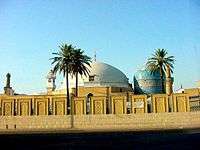Sufism in Bangladesh
| Part of a series on |
| Islam |
|---|
 |
|
Related topics |
|
Sufism in Bangladesh is more or less similar to that in the whole Indian subcontinent. India, it is claimed, is one of the five great centers of Sufism, the other four being Persia (including central Asia), Baghdad, Syria, and North Africa. Sufi saints flourished in Hindustan (India) preaching the mystic teachings of Sufism that easily reached the common people, especially, the spiritual truth seekers in India.[1]
The Sufism tremendously influenced local population and thus these Sufi masters were the single most important factor in South Asian conversions to Islam, particularly in what is now Bangladesh. Most Bangladeshi Muslims are influenced to some degree by Sufism. The conversion to Islam of the population of what was to become Bangladesh began in the thirteenth century and continued for hundreds of years. Muslim Sufis and saints (usually known as pirs in Bangladesh) and who wandered about in villages and towns, were responsible for many conversions.[2]
That is why large majority of Bangladeshi Muslims perceive Sufis as source of their spiritual wisdom and guidance and their Khanqahs and Dargahs as nerve center of Muslim society [3] These majority of Muslims in Bangladesh are Sunni, who mainly follow the Hanafi school of thought (madh'hab).[4]
Sufi principles
The Sufi principles and practices of Bangladesh are completely traced to the Quran and the Hadith. The mystical expressions of the Quranic verses of the Prophet are the direct sources of Sufism. The concepts of nafs (self), zikr (remembrance), ibadat (prayer), morakaba (meditation), miraj (ascension), tajalli (divine illumination), faqr (spiritual poverty), tawhid (Unity of God), fana (annihilation) and baqa (subsistence) are all the basic sources of Sufism, as practiced in Bangladesh.[5]
The tradition of Islamic mysticism known as Sufism appeared very early in Islam and became essentially a popular movement emphasizing worship out of a love of Allah.[6] rather than fear. Sufism stresses a direct, unstructured, personal devotion to God in place of the ritualistic, outward observance of the faith and "a Sufi aims to attain spiritual union with God through love"[6] An important belief in the Sufi tradition is that the average believer may use spiritual guides in his pursuit of the truth. Throughout the centuries many gifted scholars and numerous poets have been inspired by Sufi ideas.[7][8]
History of Sufism
Sufism in Bangladesh is owed to the great saint in Bangladesh, Khwaja Enayetpuri, (Baghdad), migrated to Delhi. Khwaja Enayetpuri, was born on Zilhaj 11, 1303 in Hizri in the district of Sirajgonj, Bangladesh. Khwaja Enayetpuri devoted eighteen years under the guidance of his Sheikh, Shah Sufi Syed Wazeed Ali, to achieve spiritual knowledge and right guidance. He preached his teachings which are respected and maintained by numbers of people in the Indian sub-continent. Khwaja Enayetpuri believed that true knowledge could be gained through mystic intuition. He said that man has the potentiality to achieve 'tajalli', the divine illumination through which he can awaken his latent Soul and control his egocentric nafs (self) so as to attain the compassion of Allah. Throughout his teachings, his mainstream of thought exhibited peace, progress and morality.[9]
Sufi chains
The Qadiri, Maizbhandaria, Naqshbandi, Chishti, Mujaddid, Ahmadi, Mohammadi, Soharwardi and Rifai orders were among the most widespread Sufi orders in Bangladesh in the late 1980s.[9]

Prominent Sufi personalities in Bangladesh includes Abdul Gafur Hali, Ahmed Ullah Maizbhanderi, Salekur Rahman Rahe Bhanderi, Sayed Delaor Husaein, Sayed Ziaul Haq, Syed Rashid Ahmed Jaunpuri. Sufism in Bangladesh is owed to the great saint in Bangladesh, Khwaja Enayetpuri, whose family lineage traced back to Baghdad but later on migrated to Delhi. The regular Sufi practice in many of the Khaneghahs in Bangladesh is zikr, assisted with ghazals. The participants of zikr do not perform any other sama (Suif music), qawwali, or dance. Sufism in Bangladesh is a silent and spontaneous movement. The Sufis and the Sheikhs in India and Bangladesh are believed to have shown many miracles and divine activities.[9]
Sufi practices
The regular Sufi practice in many of the Khanqahs in Bangladesh is zikr, assisted with Na`at. The participants of zikr do not perform any other sama (Suif music), qawwali, or dance. The only music performed with the verbal zikr is Na`at, written and sung with rhythm and melody but without any musical instrument, by the poets (performers of zikr).[9] The anniversary of the birth and death of a Sufi pir is observed annually. Popular belief holds that this anniversary is an especially propitious time for seeking the intercession of the pir. Large numbers of the faithful attend anniversary ceremonies, which are festive occasions enjoyed by the followers of the pir as well as orthodox Muslims.[2] Many, if not most, visit the graveside shrines (mazar) of pirs, some at least occasionally, many often, and an untold number rather regularly, throughout their lives.[10]
See also
References
- ↑ Dastagir, Md Golam (June 2002). "Some Aspects of Khwaja Enayetpuri's Sufism". Copula. Department of Philosophy, Jahangirnagar University. 19.
- 1 2 Heitzman, James; Worden, Robert, eds. (1989). "Islam in Bangladesh". Bangladesh: A Country Study. Washington, D.C.: Federal Research Division, Library of Congress. pp. 73–76.
- ↑ Clinton Bennett; Charles M. Ramsey (1 March 2012). South Asian Sufis: Devotion, Deviation, and Destiny. A&C Black. ISBN 978-1-4411-3589-6.
- ↑ "Bangladesh". Emory Law - Islamic Family Law. 2002. Archived from the original on 21 June 2014. Retrieved 27 September 2008.
- ↑ "SUFISM IN BANGLADESH Shah, Syed, Chishty, Nizami, Bukhari, Qadari". dargahsharif.com.
- 1 2 Burke, Thomas Patrick (2004). The major religions: An Introduction with Texts. Wiley-Blackwell. p. 280. ISBN 1-4051-1049-X.
- ↑ Shah, Idries (1991). The Way of the Sufi. Penguin Arkana. pp. 13–52. ISBN 0-14-019252-2. References to the influence of the Sufis, see Part One: The Study of Sufism in the West, and Notes and Bibliography. First published 1968.
- ↑ Shah, Idries (1999). The Sufis. Octagon Press Ltd. pp. all. ISBN 0-86304-074-8. References to the influence of the Sufis scattered throughout the book. First published 1964.
- 1 2 3 4 "Sufism Journal: Community: Sufism in Bangladesh". sufismjournal.org.
- ↑ Banu 1992;Begum and Ahmed 1990
